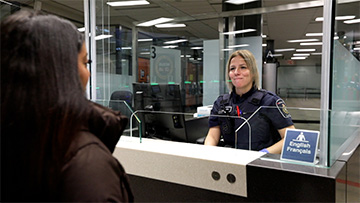How the CBSA collects, uses and protects your information
When you enter Canada, information about you and your passage is collected by the Canada Border Services Agency (CBSA). This allows us to verify your identity, assess potential risks and make sure you follow entry requirements.
Because your privacy is important, we take steps to protect your personal information and do not retain it longer than we need.
How we collect and use travel data
The CBSA is responsible for managing the entry of people and goods into Canada. When you enter Canada, whether by air, land or marine, you share your personal information with the CBSA to help us ensure the safety and security of Canada.
Here are ways we collect information:
- Travel documents: When you enter Canada, you must present your travel documents to the CBSA, such as a passport or visa, either at a primary inspection kiosk or eGate, or to an officer. These documents contain personal information like your name, date of birth, nationality and photo. This is entered into CBSA systems.
- Declaration forms: When you enter Canada, we collect information from your customs and immigration declaration. You can send us this information in advance on your smart phone or computer, at a kiosk or eGate at the airport or from a paper declaration form. Your declaration includes your personal information, details about your travel, the purpose of your visit and items you are importing.
- Biometric data: At major international airports, the CBSA uses biometrics to confirm a traveller's identity by collecting their photo and matching it with the photo in their electronic passport. At certain Canadian ports of entry, the CBSA may collect biometric information, such as fingerprints and photographs for specific types of visas and permits, as part of border security and for immigration processes.
- Vehicle information: If you are arriving by land or ferry, the CBSA may collect information about your vehicle, including its make, model and license plate number.
- Advanced passenger information / Passenger name record (API/PNR): In the case of air travel, airlines are required to provide passenger manifest information to the CBSA before landing. This includes passenger names, passport details, flight information, itinerary and travel history.
- Electronic Travel Authorization: If you are travelling to Canada by air from a visa-exempt country, you may need a travel authorization. The application for this authorization requires personal information. The CBSA will have access to this data.
- Secondary inspection: If CBSA officers have concerns about your admissibility (whether you are allowed to enter Canada) or want to verify your declaration, they may direct you to secondary inspection. During this process, they may ask you questions to verify your identity, determine admissibility of goods, review your documents and gather additional information.
- Exit information: When you travel to the U.S. at a land border crossing, we receive your biographic entry information from U.S. authorities. We use this information to create your Canadian exit record. When you leave Canada by air, we collect basic exit information directly from air carriers through passenger manifests.
- Other government departments: The CBSA may share information with the appropriate governing legislation as part of its responsibility to administer and enforce regulations on their behalf. For example, if you import illegal guns into Canada, the CBSA may share your information with the RCMP as they enforce laws on prohibited weapons.
How we protect your privacy
The CBSA collects personal information to fulfill its legal obligations related to border security, immigration, customs and public safety. The agency is subject to the Privacy Act and the Customs Act, which govern the collection, use and disclosure of personal information.
We take the protection of personal information and privacy seriously. The CBSA works closely with the Office of the Privacy Commissioner to ensure the way personal data is captured, stored, shared and disposed of respects the privacy rights and freedoms of travellers. We integrate privacy into the creation and operation of all tools and systems and retain information collected for various periods, depending on the nature of the data, its purpose and legislative requirements.
You can formally request access or a correction to your personal information by contacting the CBSA Information Sharing, Access to Information and Chief Privacy (ISATICP) Office.
Video
Related links
- Date modified:
